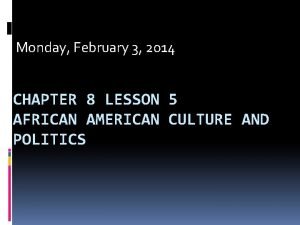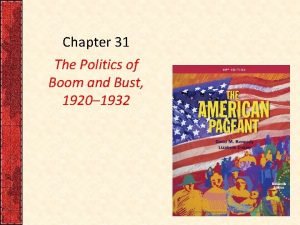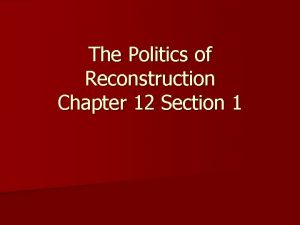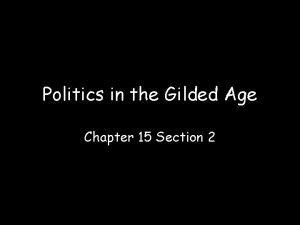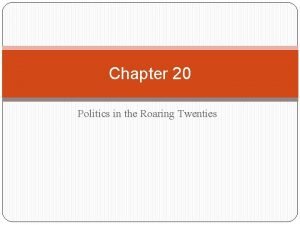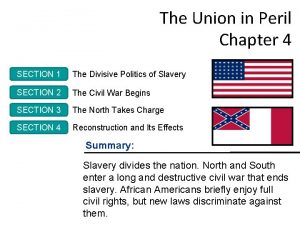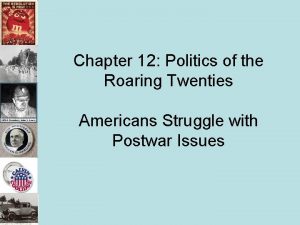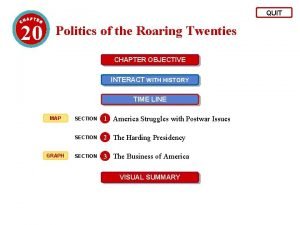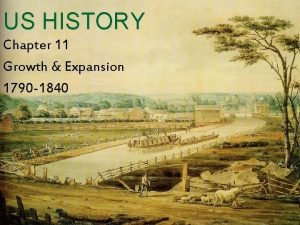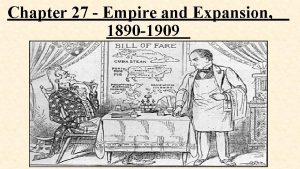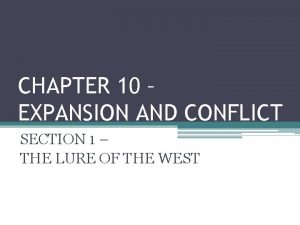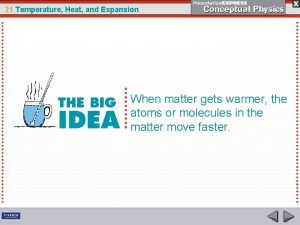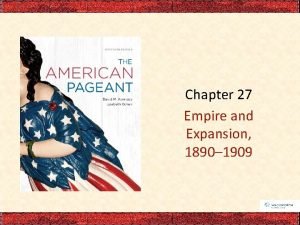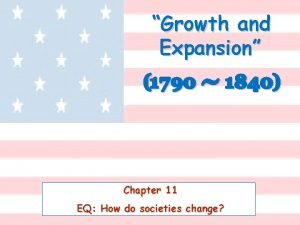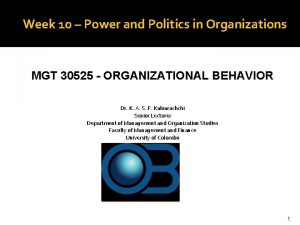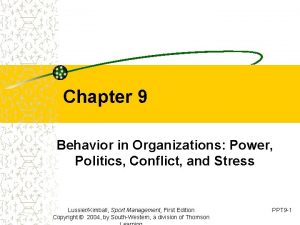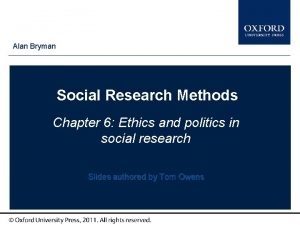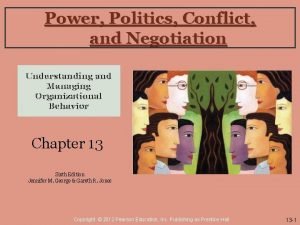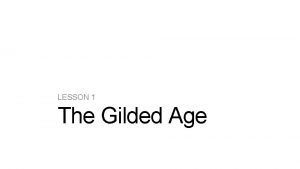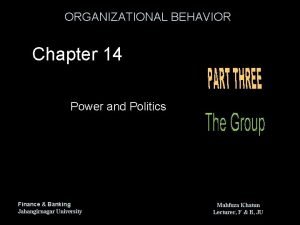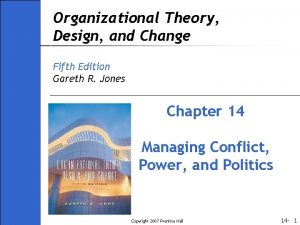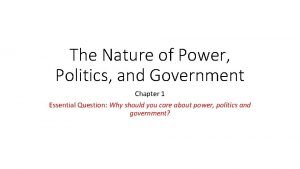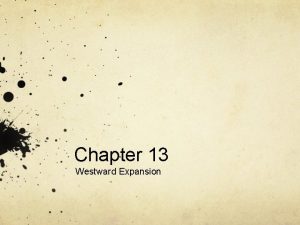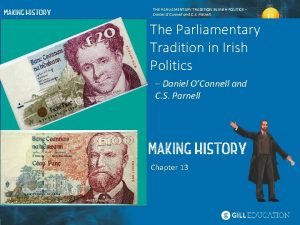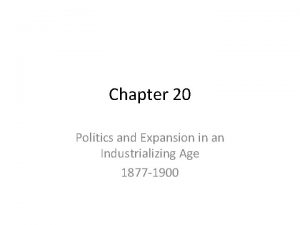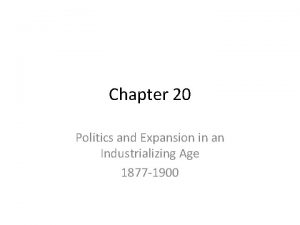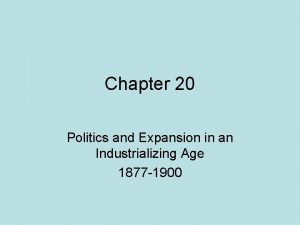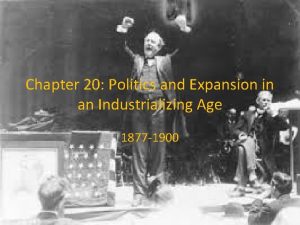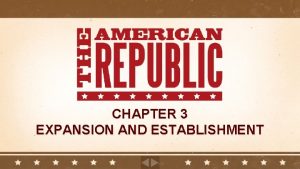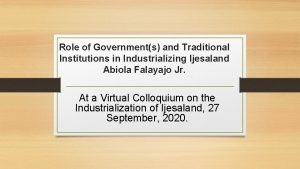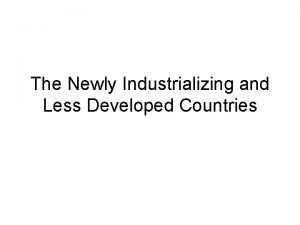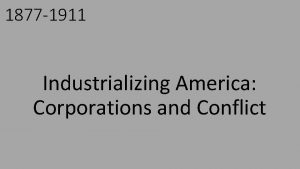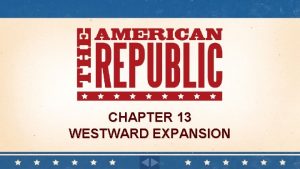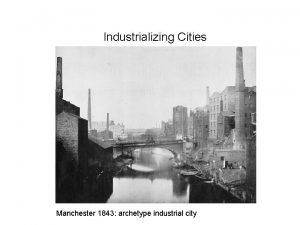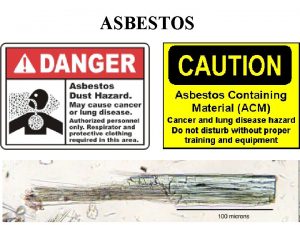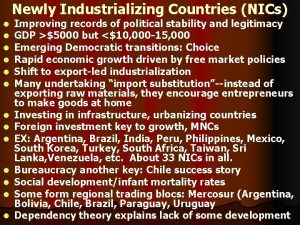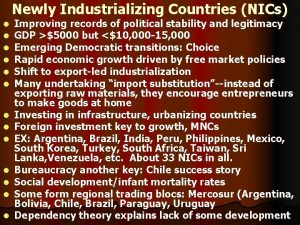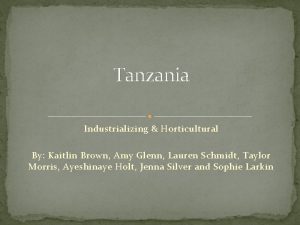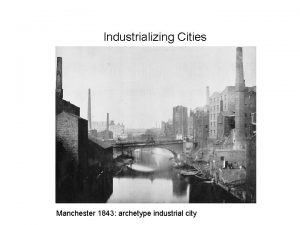Chapter 20 Politics and Expansion in an Industrializing












































- Slides: 44

Chapter 20 Politics and Expansion in an Industrializing Age 1877 -1900

Introduction § This chapter covers: § national politics between 1877 and 1900 § U. S. participation in the Spanish-American War § the race for empire

Introduction § What were the issues and the political spoils that the Democrats and Republicans fought over? § What caused the rise of the Grange, Farmers’ Alliances, and the Populist Party? § What was at stake in the election of 1896, and what was its outcome? § Why did the United States go to war with Spain in 1898 and what resulted from the American victory?

Party Politics in an Era of Upheaval, 1877 -1884 § Contested Political Visions § The Republicans and Democrats differed on tariffs and money supply § The majority of politicians of both parties held that the federal govt. had no right to regulate business or protect workers’ welfare § They were willing to subsidize and in other ways encourage corporate growth § People looked to state and local govts. to address their economic and social problems

Patterns of Party Strength § Male voter turnouts were high § Democratic and Republican parties were closely matched in strength § Democratic support was: § § Solid South States that bordered the South Recent immigrants in the big cities Most Catholics

Patterns of Party Strength (cont. ) § Republican support was: § Rural areas § Small-town New England § PA § Upper Midwest § Native-born Protestants

Regulating the Money Supply § The nation split on the questions of how much money the govt. should issue and what should back it § Those that supported limiting the money supply to what the govt. could back with its holding of gold: § Bankers § Creditors § Most businessmen § Economists § politicians

Regulating the Money Supply § Debt-ridden southern and western farmers wanted: § Larger money supply § Retention of the unbacked Civil War currency (greenbacks) § The issuing of notes backed by silver and gold § The minting of silver coins § They believed this larger money supply would raise falling farm prices and make it easier to pay off debts

Regulating the Money Supply § In the 1870’s, the Greenback Party tried to further the increased money supply idea § Even after the Party’s demise, debtor groups continued to demand a larger money supply § 1890 Sherman Silver Purchase Act § Called for the U. S. Govt. to purchase silver and issue noted redeemable in gold or silver

Civil-Service Reform § The spoils system had operated since the days of Andrew Jackson § A group of reformers saw its defects and demanded a “professional civil service based on merit” § After a crazed job seeker assassinated President James A. Garfield in 1881, Congress acted

Civil-Service Reform (cont. ) § Pendleton Act § 1883 § Created a civil-service commission to prepare competitive examinations for federal jobs § It prohibited politicians form asking govt. employees for campaign contributions § Gradually it began to raise the honesty and competence of the federal bureaucracy

Politics of Privilege, Politics of Exclusion, 1884 -1892 § A Democrat in the White House: Grover Cleveland, 1885 -1889 § Republicans nominated James G. Blaine § Tainted by corruption of the Grant era § Identified with the spoils system § Democrats nominated Cleveland § Reputation for fighting the spoilsmen § A number of Republican civil-service reformers bolted their party to support him § The Mugwump switch helped Cleveland win § 1 st Democrat elected after the Civil War

A Democrat in the White House: Grover Cleveland § Cleveland believed in laissez-faire govt. § Had little understanding of the social problems caused by industrialization

A Democrat in the White House: Grover Cleveland § He attempted to lower the tariff § He argued that reduced rates would remove a potentially corrupting govt. surplus of funds--reduce prices for consumers---slow the growth of trusts § Lower tariffs appealed to: § farmers and many Democrats from the West and South § Lower tariffs alarmed: § Manufacturers § Those Republicans who looked out for their own interests § Cleveland also angered Civil War veterans when he halted wholesale granting of disability pensions to them

Big Business Strikes Back, Benjamin Harrison, 1889 -1893 § The tariff became a major issue in the election of 1888 § Democrats renominated Cleveland § Republicans nominated Benjamin Harrison § High protective tariffs § Industrialists contributed heavily to the Republicans § Cleveland received more popular votes than Harrison (48. 6% to 47. 8%) § Harrison won the Electoral College (233 to 168)

Big Business Strikes Back, Benjamin Harrison, 1889 -1893 § Mc. Kinley Tariff § 1890 § Passed by Republicans § Raised the tariff rates to an all-time high § They also rewarded Civil War veterans with generous pensions

Agrarian Protest and the Rise of the People’s Party § When prices of wheat and other agricultural products dropped in the 1870’s, debtburdened farmers fell on hard times § They responded by forming the first nationwide agricultural organization § The Patrons of Husbandry § A. k. a. Grange § Led by Oliver H. Kelley

Agrarian Protest and the Rise of the People’s Party (cont. ) § The Grange tried to help farmers economically by organizing cooperatives to market their crops and buy supplies § It also lobbied state legislatures to regulate the railroads § Stop the overcharging of farmers, giving of discounts to large shippers, and bribing state officials § A number of states did pass Granger Laws § They were bitterly attacked by the railroads as unconstitutional

Agrarian Protest and the Rise of the People’s Party (cont. ) § At first federal courts upheld state regulations § 1886 Wabash case § The Supreme Court ruled that states could not regulate interstate railroads § Congress stepped into the void by passing the Interstate Commerce Act (ICA) in 1887 § ICA created the Interstate Commerce Commission (ICC) to investigate and oversee railroad practices

Agrarian Protest and the Rise of the People’s Party (cont. ) § The ICA did little to curb railroad abuses § The law and the ICC set a precedent for future federal regulation of interstate commerce § The failure of the Granger Laws and the Grange’s other efforts to help farmers economically led to the organization’s decline after 1878

Agrarian Protest and the Rise of the People’s Party (cont. ) § Farmers believed that the federal govt. was unresponsive to their needs § Western and southern farmers suffered from: § falling agricultural prices § A tight money supply § High interest rates § Heavy in debt § Being overcharged by industrial trusts, grain elevator operators, and railroads

Agrarian Protest and the Rise of the People’s Party (cont. ) § Earlier, farmers had turned to the Grange and the Greenback Party to redress their grievances § When these failed, farmers joined the Southern Alliance, National Colored Farmers’, or the Northwestern Alliances § The alliances called for: § Tariff reduction § A graduated income tax § Public ownership of railroads § “free silver”

Agrarian Protest and the Rise of the People’s Party (cont. ) § In 1892, the alliances founded the People’s Party (or the Populist Party) § Developed a platform on their program § They also endorsed the direct election of senators and other electoral reforms § Nominated James B. Weaver for president

The 1890’s: Politics in a Depression Decade § 1892: Populists Challenge the Status Quo § Democrats nominated Cleveland § Republicans nominated Harrison § Populist nominated Weaver § Won about million votes § Few came from the urban Northeast § Gained less than 1/4 of the votes of the agricultural South § Largely because of the race issue § Cleveland won

Capitalism in Crisis: The Depression of 1893 -1897 § Soon after Cleveland was inaugurated, the nation suffered a financial panic that ushered in a severe depression § During the depression: § Thousands of banks and businesses failed § 20 -25% of the labor force was unemployed § Agricultural prices fell more than 20% § Completing the ruin of many farmers already in economic difficulty

Capitalism in Crisis: The Depression of 1893 -1897 § Hard times increased the appeal of the Populists and spawned strikes and protests § In 1894, Jacob Coxey led a march of the unemployed on Washington to demand a publicworks program to create jobs § He was arrested and the demonstration was broken up § The heightened unrest frightened the middle class

Business Leaders Respond § Cleveland opposed govt. help for victims of the depression § His use of force against the Pullman strikers and Coxey’s marchers appeared heartless § He angered farmers when he induced Congress to repeal the Sherman Silver Purchase Act § In defense of the gold standard

Business Leaders Respond (cont. ) § Cleveland’s actions split the party § Democrats from agricultural states began to favor free silver § Hard times also led many Americans to question the laissezfaire doctrine

1894: Protest Grows Louder § The voters repudiated Cleveland in the 1894 midterm elections § Congress went Republican § The vote for Populist candidates climbed more than 40% above their 1892 tallies

1894: Protest Grows Louder (cont. ) § The issue of free silver came to symbolize the deep split between economic classes § Creditors feared that abandonment of a strictly gold standard would cause runaway inflation and ruin § Debt-ridden farmers saw silver as the cure that would rise farm prices and return prosperity

Silver Advocates Capture the Democratic Party § At the 1896 Democratic convention, western and southern delegates gained control § They wrote a platform calling for free silver § Nominated William Jennings Bryan § The Republicans nominated William Mc. Kinley § Promised to maintain the gold standard § Raise the protective tariff § The Populists endorsed Bryan § Feared that if they ran their own candidate, they would split the farm vote § Nominated one of their own, Tom Watson, for VP

1896: Republicans Triumphant § Mc. Kinley received huge campaign contributions from businessmen who feared Bryan § Bryan was also handicapped by the lack of appeal of free silver to factory workers and the urban middle class § They realized that it would probably bring about higher food prices § Mc. Kinley won the election § Carried the Northeast, Midwest, and most cities § The Republicans also kept its majority in Congress

1896: Republicans Triumphant (cont. ) § As promised, Mc. Kinley and the Republicans maintained the gold standard and raised the tariff to an all-time high § These policies aroused little opposition because prosperity returned § More gold became available with new discoveries § farm prices began to rise § Mc. Kinley easily beat Bryan for a 2 nd term in the 1900 election

1896: Republicans Triumphant (cont. ) § The elections of 1894 and 1896 ushered in a long period of Republican dominance in U. S. politics that lasted almost unbroken until the 1930’s § The Populist Party disintegrated after 1896 § Many of the reforms it had advocated were enacted by Progressives after 1900

African-Americans After Reconstruction § After Reconstruction, white Democrats in the South increasingly deprived black southerners of the right to vote § At first the whites used intimidation and terror § After 1890 they used more effective means: § Poll taxes § Literacy tests § Grandfather clauses

African-Americans After Reconstruction (cont. ) § Southern blacks also were victimized by: § segregation laws § the convict-lease system § Lynching § Some southern Populists attempted to combat prejudice § Encouraged white and black farmers to unite against their exploiters § The Southern Democratic elite purposely inflamed racial antagonism to keep poor farmers divided

African-Americans After Reconstruction (cont. ) § The federal govt. did nothing to protect black rights § The Supreme Court gave it stamp of approval to segregated but equal facilities in Plessy v. Ferguson (1896) § Plessy summary § It also upheld poll taxes and literacy tests in 1898

African-Americans After Reconstruction (cont. ) § Blacks responded to these abuses in several ways § Some fled the South only to find de facto segregation in the North § Booker T. Washington advised fellow blacks to accept their second-class status for a time and concentrate on getting ahead economically and educationally

African-Americans After Reconstruction (cont. ) § Abolitionist Frederick Douglass still called on blacks to demand full equality § The South became a one-party region always controlled by the Democrats § With the disenfranchisement of blacks § The defeat of southern populism

African-Americans After Reconstruction (cont. ) § The South became a one-party region always controlled by the Democrats § With the disenfranchisement of blacks § The defeat of southern populism

Conclusion § Between 1877 and 1896, the 2 major political parties (Democrats and Republicans) were closely matched in strength § Each party had loyal followers: § Democrats: § The South and new immigrants in cities § Republicans: § Rural and small town native-born Americans in the Northeast and Midwest

Conclusion (cont. ) § Both parties ignored the pressing economic problems of the country’s farmers § The farmers turned successively to the Grange, the Farmers’ Alliance, and the Populist Party § In 1896, when the Populist joined the Democrats in backing William Jennings Bryan, big business used its financial might to turn back the Populist challenge and elect Mc. Kinley president

Conclusion (cont. ) § Mc. Kinley’s victory marked the start of a long period of Republican dominance in national politics § The Mc. Kinley administration soon led the U. S. into the Spanish-American War and an imperialist foreign policy

Conclusion (cont. ) § However, this burst of expansionism in the late 19 th century and early 20 th century never fully diverted U. S. attention from domestic issues § The Populist Party, thought it was defeated in 1896, left behind the feeling that: § govt. must free itself from business domination § govt. must play a more active role in solving the economic and social problems arising form industrialization § After the turn of the century, the Progressive movement would build on that new attitude
 Chapter 8 lesson 5 african american culture and politics
Chapter 8 lesson 5 african american culture and politics Chapter 31 the politics of boom and bust
Chapter 31 the politics of boom and bust Chapter 12 section 1 the politics of reconstruction
Chapter 12 section 1 the politics of reconstruction Chapter 15 section 3 politics in the gilded age
Chapter 15 section 3 politics in the gilded age Chapter 20 politics of the roaring twenties
Chapter 20 politics of the roaring twenties Reconstruction and its effects
Reconstruction and its effects Chapter 4 section 1 the divisive politics of slavery
Chapter 4 section 1 the divisive politics of slavery Politics in the gilded age chapter 7 section 3
Politics in the gilded age chapter 7 section 3 Chapter 12 politics of the roaring twenties
Chapter 12 politics of the roaring twenties Politics of the roaring twenties
Politics of the roaring twenties Chapter 20 politics of the roaring twenties
Chapter 20 politics of the roaring twenties Specific heat of platinum
Specific heat of platinum Chapter 15 temperature heat and expansion
Chapter 15 temperature heat and expansion Lesson 2 moving west
Lesson 2 moving west Chapter 21 temperature, heat and expansion answer key
Chapter 21 temperature, heat and expansion answer key 1909
1909 Chapter 10 expansion and conflict worksheet answers
Chapter 10 expansion and conflict worksheet answers Solid liquid gas particles
Solid liquid gas particles Chapter 12 territorial and economic expansion
Chapter 12 territorial and economic expansion Chapter 27 empire and expansion
Chapter 27 empire and expansion Chapter 21 temperature heat and expansion
Chapter 21 temperature heat and expansion Chapter 21 temperature heat and expansion
Chapter 21 temperature heat and expansion Chapter 11 growth and expansion vocabulary
Chapter 11 growth and expansion vocabulary Power and politics in organizations
Power and politics in organizations Political opportunities in media and information
Political opportunities in media and information Bureaucracy and politics in india
Bureaucracy and politics in india Power politics and conflict in organizations
Power politics and conflict in organizations Ethics and politics in social research bryman
Ethics and politics in social research bryman Conflict power and politics
Conflict power and politics Philosophy, politics and economics michael munger
Philosophy, politics and economics michael munger The tournament of today
The tournament of today Chapter 20 whose government
Chapter 20 whose government Politics and international relations bath
Politics and international relations bath Ap government unit 4 study guide
Ap government unit 4 study guide Politics and law atar
Politics and law atar Relationship between sport and politics
Relationship between sport and politics Politics and the english language
Politics and the english language Contrasting leadership and power
Contrasting leadership and power Power and politics organization theory
Power and politics organization theory Power and politics
Power and politics The nature of power politics and government
The nature of power politics and government Chapter 13 westward expansion
Chapter 13 westward expansion World politics in a new era
World politics in a new era The politics of translation spivak
The politics of translation spivak What was the parliamentary tradition
What was the parliamentary tradition
